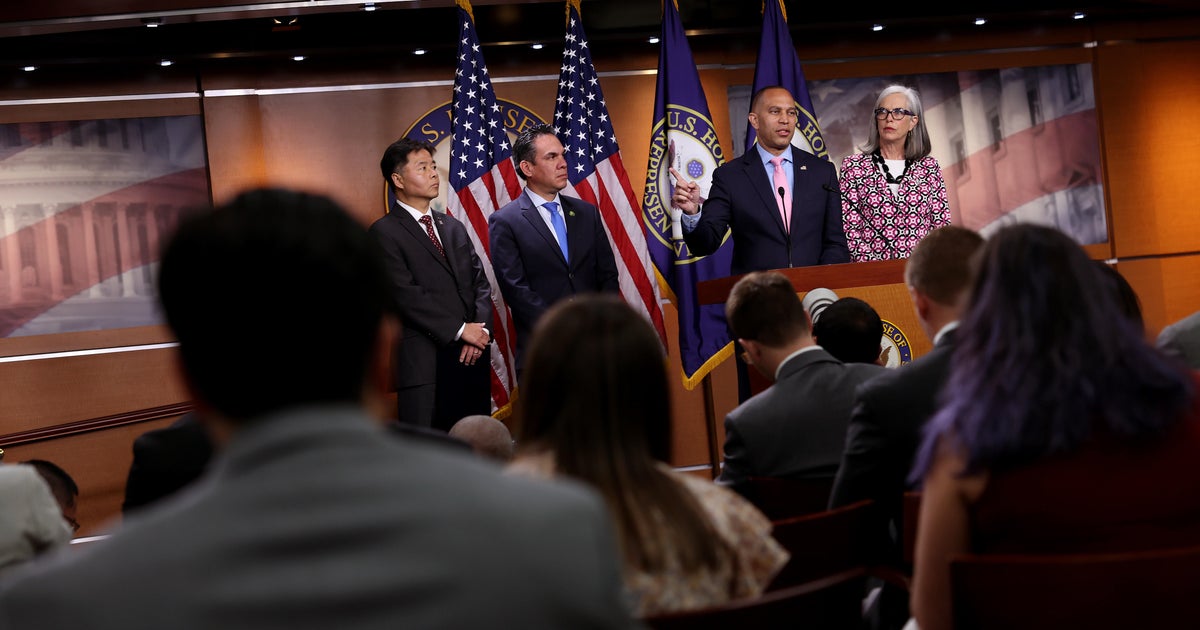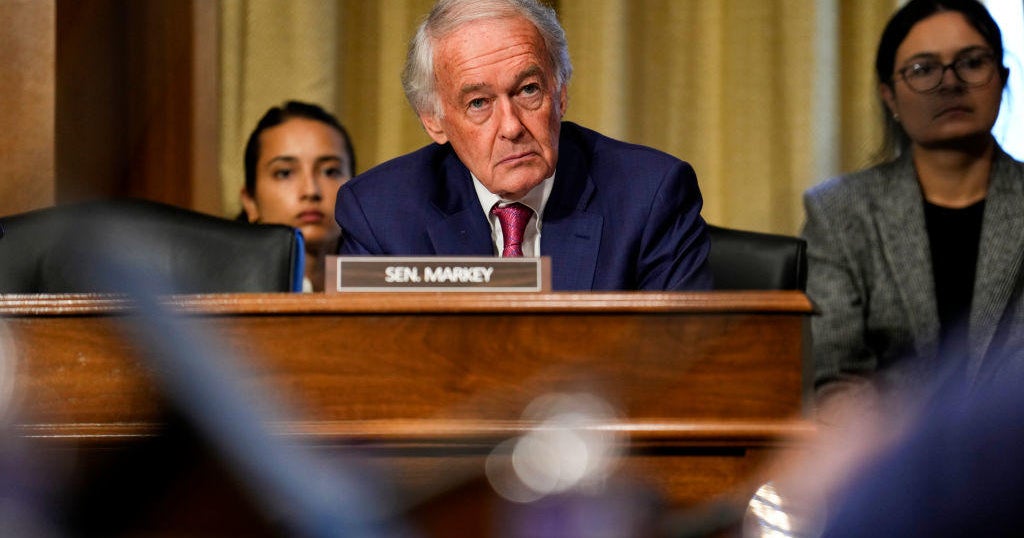Texas Democrats who fled state for D.C. call on Congress to pass voting rights bills
Washington — The Texas Democratic lawmakers who fled the state for Washington, D.C., to block a vote on a GOP-backed voting and elections bill called on Congress to pass federal voting rights protections and said they were prepared to continue their stand-off with Republicans.
Appearing with members of Texas' federal congressional delegation outside the U.S. Capitol, the lawmakers urged Congress to pass the For the People Act, a sweeping federal elections bill, and the John Lewis Voting Rights Act, which is aimed at shoring up a key provision of the Voting Rights Act.
Harris met with about 60 of the Texas state legislators on Tuesday, calling them "fighters" and comparing what they are doing with the bipartisan defense of the 1965 Voting Rights Act.
"Defending the right to vote is as American as apple pie," Harris said.
More than 50 Democratic lawmakers from the Texas House of Representatives left on Monday to prevent a quorum during the special legislative session that is being held because they scuttled the May legislative session — also by leaving — to block the elections bill.
"We are here in D.C., our nation's capital, because we want to protect the civil right to vote for millions of Texans. We were quite literally forced to move and leave the state of Texas. We also know that we are living right now on borrowed time in Texas, and we can't stay here indefinitely to run out the clock, to stop Republican anti-voter bills. That's why we need Congress to act now, and pass the For The People Act," state Representative Rhetta Bowers said. "Texas Democrats will use everything in our power to fight back, but we need Congress to act now."
Two main election bills are under consideration in the Texas House and Senate. Both measures would eliminate drive-thru and 24-hour early voting, expand early voting hours to some medium-sized counties, add identification requirements for voting by mail, increase criminal penalties for some election officials who don't follow regulations and give more powers to poll watchers.
Chris Turner, the chair of the Texas House Democratic Caucus, said at least 57 members of the 150-member Texas House had instructed the body's clerk to lock their voting machines inside the chamber, effectively denying Republicans the 100-member quorum needed to hold a vote.
With no quorum present in the Texas House on Tuesday morning, lawmakers who were in Austin passed a motion 76 to 4 that authorized the sergeant-at-arms and his officers to find any members who are absent without an excuse "for the purpose of securing and maintaining their attendance under warrant of arrest if necessary." It is not clear how or whether this can be utilized while the Democrats are in Washington.
Turner said Democrats were prepared to remain outside Texas until the conclusion of the special legislative session.
"Our intent is to stay out and kill this bill this session, and use the intervening time — I think 24, 25 days now before the end of this session — to implore the folks in this building behind us to pass federal voting rights legislation to protect voters in Texas and across the country," Turner said, pointing to the Capitol.
Rafael Anchia, the chair of the Mexican American Legislative Caucus, said Texas Governor Greg Abbott had "poisoned the entire process" and said Democrats would continue fighting Republican efforts to restrict access to the ballot box.
"We're not doing this for Democrats. We're doing this for Republicans, we're doing this for independents, we're doing this for north Texans and south Texans and east and west Texans," Anchia said. "We are not going to buckle to 'The Big Lie' in the state of Texas. The Big Lie that has resulted in anti-democratic legislation across the United States."
The decision to leave the state echoes a move by Democratic lawmakers in 2003 who fled to Oklahoma and New Mexico during a fight over redistricting. Leaving the state prevents law enforcement officials from rounding up lawmakers and forcing them to go back to work. But even if Democrats remain out of the state for the rest of the special session, Abbott, the governor, can call additional special sessions to tackle his legislative priorities, which he has said he will do.
"I can and I will continue to call special session after special session after special session all the way up until the election next year," Abbott told KVUE in Austin on Monday.
In 2003, then-Governor Rick Perry called three special sessions before the redistricting fight ended. Joshua Blank, the director of research for the Texas Politics Project at the University of Texas, said in 2003 Senate Democrats finally came back from New Mexico after realizing that they had lost some negotiating power.
"The difficulty of this approach, this tactical approach by Democrats, is that it's dependant on how long enough of them to deny a quorum are willing to stay out of state," Blank said. "Secondarily, it depends on how the politics of this play out over the coming weeks and months."
Blank said special sessions in Texas can start as soon as another special session ends.
In an interview with Texas radio station KFYO Tuesday morning, Abbott said any Democrats who left the state should be stripped of their leadership positions. He also doubled down on his recent decision to veto funding for the state legislature. That funding, which includes pay for staff, is set to run out on September 1 and Abbott said Democrats are jeopardizing restoring the money by walking out. Democrats have challenged that veto in the Texas Supreme Court.
Twenty-two members voted in the Texas Senate on Tuesday morning, which is enough for a quorum in the 31-member chamber. Nine Senate Democrats went to Washington, D.C., to join their House colleagues.
"Members, I want to thank the 22 of you who are here for a quorum today as the Senate will do our business this week," Lieutenant Governor Dan Patrick said Tuesday. Patrick also serves as president of the Senate and said Monday that the chamber will vote on its election bill.
The decision to leave the state echoes a move by Democratic lawmakers in 2003 who fled to Oklahoma during a fight over redistricting. Leaving the state prevents law enforcement officials from rounding up lawmakers and forcing them to go back to work. But even if Democrats remain out of the state for the rest of the special session, Abbott, the governor, can call additional special sessions to tackle his legislative priorities, which he has said he will do.
In an interview with Texas radio station KFYO Tuesday morning, Abbott said any Democrats who left the state should be stripped of their leadership positions. He also doubled down on his recent decision to veto funding for the state legislature. That funding, which includes pay for staff, is set to run out on September 1 and Abbott said Democrats are jeopardizing restoring the money by walking out. Democrats have challenged that veto in the Texas Supreme Court.
Twenty-two members voted in the Texas Senate on Tuesday morning, which is enough for a quorum in the 31-member chamber.
"Members, I want to thank the 22 of you who are here for a quorum today as the Senate will do our business this week," Lieutenant Governor Dan Patrick said Tuesday. Patrick also serves as president of the Senate and said Monday that the chamber will vote on its election bill.
Tim Perry and Fin Gómez contributed to this report.




